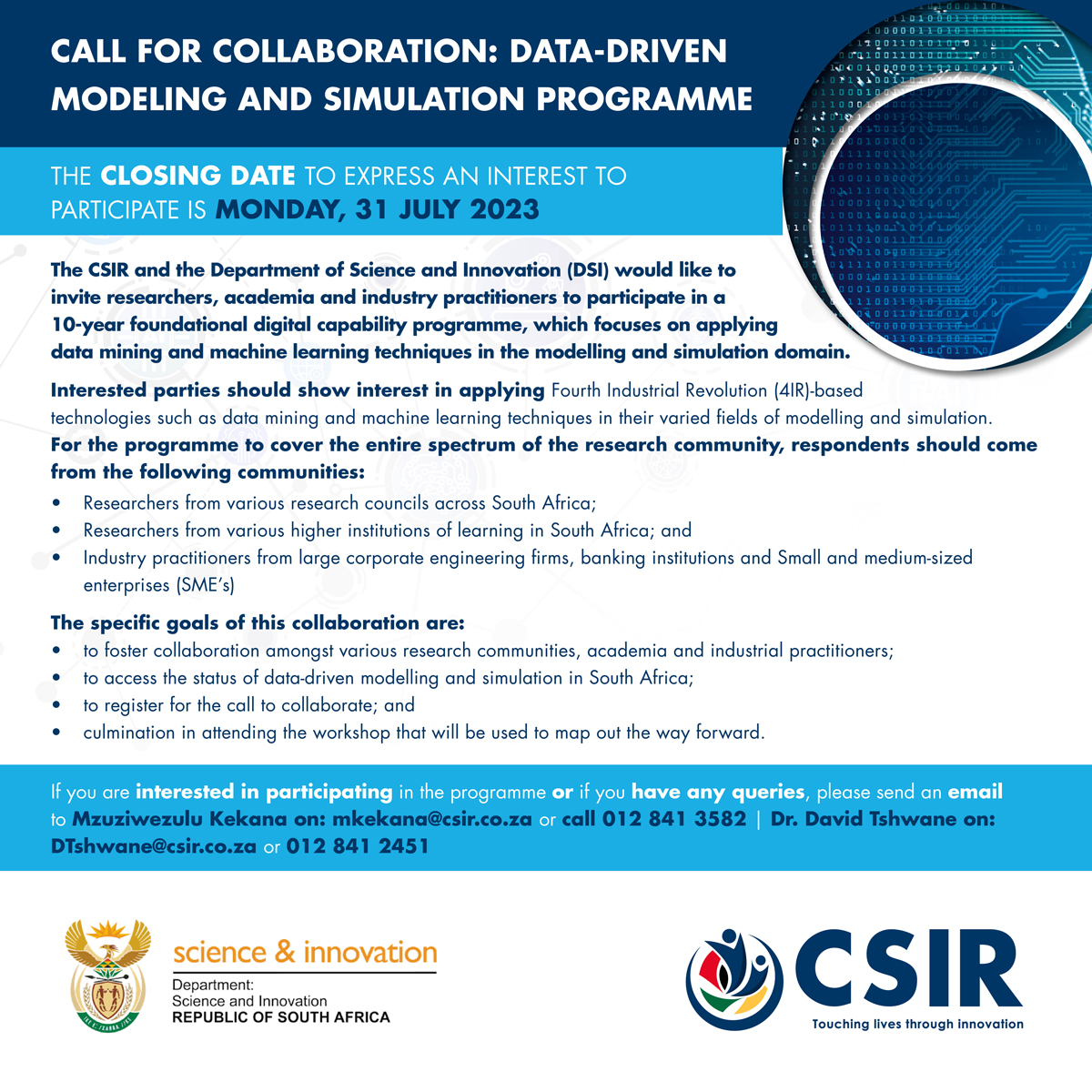Advanced Search
Search Results
Request for Proposals (RFP) The provision of services to develop, update and expand Business Plan training material, also review and expand guidelines on Sustainable Finance Options Available to South African Businesses on behalf of the CSIR.
The CSIR’s Detonics, ballistics and explosives laboratory (DBEL) is a uniquely equipped facility, outside of the City of Tshwane, where experimentation is conducted to determine the impact of blast
National Science Week is an initiative of the Department of Science and Innovation aimed at celebrating science and its significant impact on society. During the launch, thousands of learners from various schools in and around Vhembe District will be exposed to an assortment of activities aimed at exposing them to various career pathways and skills required in science, technology, engineering, mathematics and innovation (STEMI), with the hope of encouraging them to pursue careers in STEMI.
Water Research Centre
Overview
The CSIR Water Research Centre contributes to the provision of reliable, efficient and functional water and wastewater service delivery, in the interest of economic development, through the development and refinement of smart water use and infrastructure technologies for the public and private sectors.
The centre addresses shortcomings in South Africa’s water planning and accountability; infrastructure operation and maintenance; water treatment technologies and critical domain skills. It also focuses on dwindling water resources, deteriorating water quality, emerging water pollutants and lack of access to alternative water resources.
Strategic objectives
The CSIR invests in the development of technology/software/tools that will improve water resources resilience, thus ensuring availability of water of high quality against the backdrop of the impact of climate change and other stressors, such as trade-offs within the food-water-energy nexus.
The organisation helps improve water management systems through its contributions towards policy reviews and the development of tools and techniques that will reduce the cost of water delivery and promote equitable water use. The aim is to ensure improved water testing methods, purification, water and wastewater treatment, and access to alternative water resources.
The CSIR Water Research Centre also contributes towards scarce skills development (human capital development) in the water sector through bursary and internship programmes.
Researchers aim to develop fit-for-purpose technologies for the development and optimisation of smart and robust water use and wastewater infrastructure with concomitant improved operation and maintenance.
Offerings
Smart water use: Provide knowledge, innovation, skills and services to improve water supply and demand management through effective water resources planning. This also includes improved assessment and testing of water resources, pathways and effluents, and the development of low-cost technology solutions to mitigate water quality challenges.
Smart water infrastructure: Develop comprehensive water infrastructure lifecycle solutions (design, operation and performance management) with a specific focus on raw water reticulation, potable water distribution network, wastewater distribution networks, and water and wastewater treatment plants.
Selected interventions and technologies
Potable water network management through smart systems
Challenge: Dilapidated and poorly operated water supply infrastructure contributing to poor service and non-revenue water.
Solution: (Near) Real-time water distribution network data acquisition with automated analysis and response for enhanced operation and maintenance.
- Smart pressure management system
- Continuous leak detection
- Show stresses on the network
- Smart water metering
- Overview of network performance
- Smart water quality monitoring tools
Decentralised wastewater treatment systems to augment centralised wastewater treatment plants with circular economy benefit
Challenge: Water supply and sanitation backlogs, due to lack of sufficient infrastructure funding, among others.
Solution: Low energy demand and chemical-free water purification and supply, as well as wastewater treatment decentralised systems.
- Low capital expenditure;
- Low operating expenditure; and
- Ease of deployment
Taking advantage of the fourth industrial revolution for development of advanced technologies for water resources management for different users
Challenge: Lack of innovative and effective water data collection, storage and use.
Solution: A National Centralised Water Data Repository that would be easy to access, generate and extract valuable information from in support of water security, economic growth; and
Refine existing tools and develop new tailor-made tools and software to support decision making in water management and planning.
The students wanted to visit the CSIR to learn about the latest research in agriculture, water, climate change and remote sensing. With little time to spare, Mobe set about composing the perfect programme, to the delight of Frederick Mashao of the Department of Geography and Environmental Studies and the School of Agricultural and Environmental Sciences at UL. Read more...
Request for Quotation (RFQ) for the supply of a Mode-locked all fiber pulsed laser to the CSIR
Request for Proposals (RFP) The Provision of Capture the Flag Challenges for the 2023 SANReN Cyber Security Challenge
Haasbroek and fellow CSIR engineer, Vuyo Ndayi, represented the CSIR at Datawell BV from 17 to 21 July 2023 for the specialised Waverider® technical training in the Netherlands. The training focused on Waverider® buoy maintenance, fault identification and servicing. During their four-day visit, Haasbroek and Ndayi gained valuable insights into the existing hardware and software, as well as the new hardware and software developments taking place at Datawell BV®.



